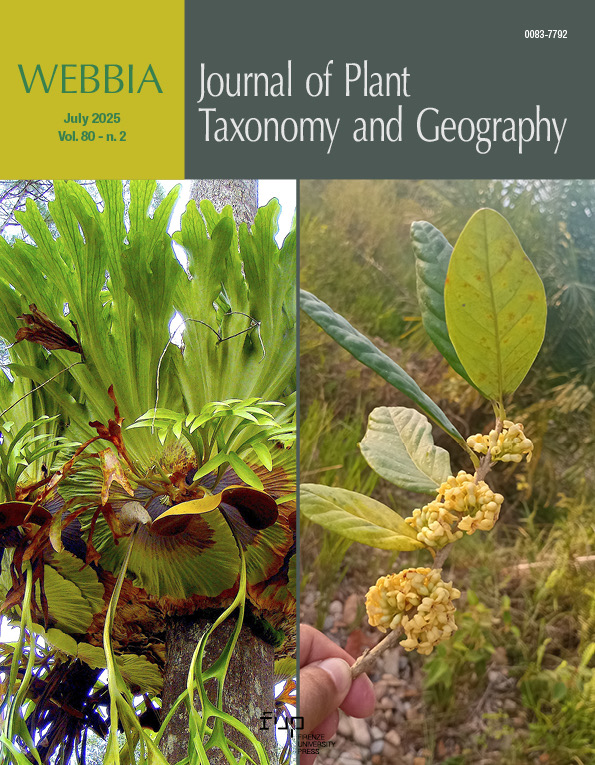Published 2025-07-18
Keywords
- Africa,
- endemic,
- Haplocoelum,
- Sapindaceae,
- vulnerable
How to Cite
Copyright (c) 2025 Xander van der Burgt, Eric Ngansop Tchatchouang, Barthélemy Tchiengué

This work is licensed under a Creative Commons Attribution 4.0 International License.
Abstract
Haplocoelum aurantium Burgt, Ngansop & Tchiengué, Sapindaceae, is described and illustrated. It is a tree, to 18 m high, with a stem to 50 cm diameter, often overhanging. On mature trees the leaves usually have 8–18 leaflets; 40% of leaves have 14 or 16 leaflets. 28% of leaves have an odd number of leaflets. The leaflets are opposite, sub-opposite, or alternate. The flowers are unknown. The fruits are indehiscent, orange and globular, 1.5–2.3 cm diameter. Haplocoelum aurantium occurs in submontane forest, at 700–1400 m elevation. The tree species is endemic to Cameroon, in parts of the Littoral Region, Southwest Region and West Region. Twelve herbarium collections have been made, in an area of 7500 km2. Haplocoelum aurantium is provisionally assessed as Vulnerable.
References
- Davies FG., Verdcourt B. 1998. Haplocoelum. Pp. 43 – 47. In: Flora of Tropical East Africa, Sapindaceae.
- Exell AW, Fernandes A, Wild H. 1966. Haplocoelum. Pp. 530 – 533. In: Flora Zambesiaca, volume 2, part 2.
- Fouilloy R., Hallé N. 1973. Flore du Cameroun 16. Sapindacées. MNHN Paris. Pp. 202.
- Friis I. Verdcourt B., Vollesen K. 1996. New combinations in African Sapindaceae. Kew Bulletin. 51: 802. DOI: https://doi.org/10.2307/4119737
- IPNI 2025. International Plant Names Index. Published on the Internet http://www.ipni.org The Royal Botanic Gardens, Kew, Harvard University Herbaria & Libraries and Australian National Herbarium. [Retrieved 17 January 2025].
- IUCN 2012. IUCN Red List categories and criteria. Version 3.1. Second edition. Prepared by the IUCN Species Survival Commission. IUCN, Gland & Cambridge. https://www.iucnredlist.org/resources/categories-and-criteria
- IUCN 2024. Guidelines for Using the IUCN Red List categories and criteria. Version 16. Prepared by the Standards and Petitions Committee of the IUCN Species Survival Commission. Published at https://www.iucnredlist.org/resources/redlistguidelines
- MINFOF & WRI 2024. Cameroon’s Forest Estate, December 2023. Map, published 10 May 2024. Cameroon Ministry of Forestry and Wildlife (MINFOF) & World Resources Institute (WRI). https://data.globalforestwatch.org/
- Murphy B, Onana JM, van der Burgt X, Ngansop ET, Williams J, Tchiengue B, Cheek M. 2023. Important Plant Areas of Cameroon. Royal Botanic Gardens, Kew. 302 pp.
- ShorthouseDP. 2010. SimpleMappr, an online tool to produce publication-quality point maps. Retrieved from https://www.simplemappr.net Accessed January 19, 2025.

